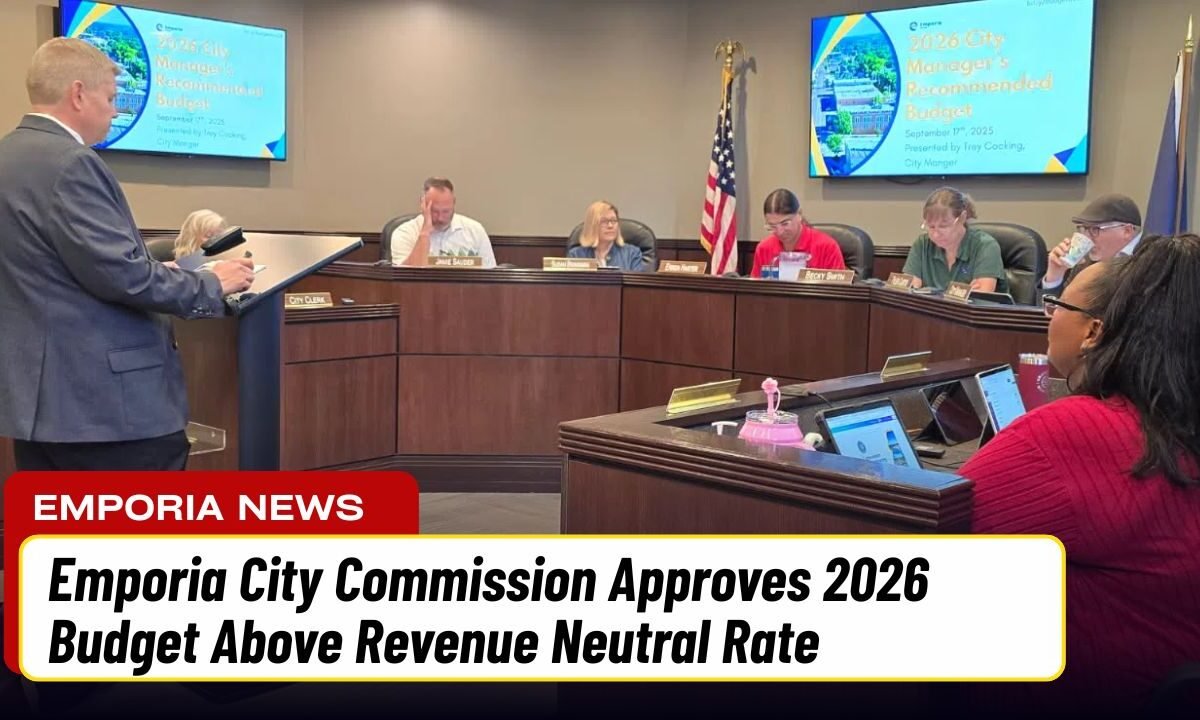The Emporia City Commission has officially adopted the 2026 city budget, totaling $88,687,562 in planned expenditures. Of this amount, $11,544,446 will be funded through Ad Valorem Tax.
The budget sets the mill levy rate at 46.015, which exceeds the Revenue Neutral Rate (RNR) of 43.347 mills.
Public Hearing Highlights
Before approving the budget, the Commission conducted a public hearing to discuss both the 2026 budget and the decision to exceed the RNR.
City Manager Trey Cocking addressed the audience to explain the main factors contributing to the rising expenses. He cited:
- Pay increases across all city departments
- Rising insurance and healthcare costs
- Higher capital spending requirements
- The ongoing impact of inflation
Cocking illustrated inflation’s effect by noting that the cost of a fire truck has nearly doubled in a decade, climbing from $475,000 to $900,000.
Concerns About Property Taxes
During the hearing, Becky Morgan, who had also spoken at the Lyon County Commission’s budget hearing, raised concerns about property taxes. She expressed frustration over the city surpassing the RNR, stating:
“Emporia is in a crisis. I think with the revenue that we take in, we don’t need to be going over the RNR.”
Her remarks sparked further discussion among city officials, including Cocking, Deputy City Manager Mark Detter, and several commission members, who shared their views on how tax revenues are allocated.
County vs. City Spending Debate
Much of the conversation focused on how Lyon County allocates the tax revenue it collects—particularly funds spent outside Emporia city limits.
Detter explained that on a typical $4,500 property tax bill, about $450 goes to Road & Bridge, which he said primarily maintains county roads outside Emporia.
He emphasized:
“It’s unfair that you have to subsidize the rest of them with your taxes. We have the poorest people in Lyon County who are subsidizing the wealthiest people outside of the community.”
Attempts to bring together the county, city, and school board to discuss property tax concerns have repeatedly failed, leaving both commissions urging residents to address their complaints directly to the other side.
Final Adoption and Proclamation
After the public hearing concluded, the Commission formally adopted the 2026 budget and approved the annual appropriation.
Additionally, representatives from SOS spoke about their efforts in assisting domestic violence victims in Lyon and surrounding counties.
Following this, the Commission issued a proclamation declaring October 2025 as Domestic Violence Awareness Month in Emporia, echoing a similar action taken earlier by the Lyon County Commission.
The Emporia City Commission’s approval of the 2026 budget underscores the challenges of balancing rising operational costs with public concerns about taxation.
While city leaders defend the budget as essential for maintaining services amid inflation and increased expenses, many residents remain worried about property tax burdens. The coming year will likely bring continued debate over how local funds are distributed between city and county needs.




